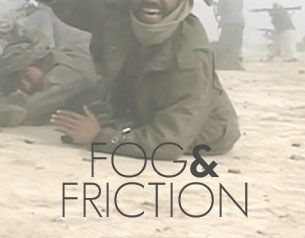Fog and Friction
Modern war is complicated. The media and army become intertwined. The world perceives war through the eyes of the journalists and sometimes even the military does. Can this sometimes devastating paradox be reconciled?
 Modern war is complicated. The media and army become intertwined. The world perceives war through the eyes of the journalists and sometimes even the military does. Strategists refer to the two fundamentals of battle chaos as 'Fog' and 'Friction'. But what do these words mean in the context of today's wars; Iraq, Afghanistan? And a 24 hour news agenda with journalists embedded alongside soldiers. Made by seasoned war correspondent Dodge Billingsley and full of frontline footage of contemporary wars.
Modern war is complicated. The media and army become intertwined. The world perceives war through the eyes of the journalists and sometimes even the military does. Strategists refer to the two fundamentals of battle chaos as 'Fog' and 'Friction'. But what do these words mean in the context of today's wars; Iraq, Afghanistan? And a 24 hour news agenda with journalists embedded alongside soldiers. Made by seasoned war correspondent Dodge Billingsley and full of frontline footage of contemporary wars.
Under cover of darkness US infantry units and journalists huddle nervously inside their troop carriers as they advance into Iraq. Through blurry night vision glasses and a raging sandstorm, the desert terrain appears confusing. Rockets explode around them. 'One tank out with friendly fire', Moments later news comes in which throws their battle plan into even more disarray.
'A report came in that there were 100 tanks to the North of us,' states Col Benson. 'Where could they have come from?' Fearing an impending ambush, they alter their plans and prepare for battle. But when a reconnaissance mission is sent out, they discover the 180 tanks were in fact, six tanks, which had been reported many times. Now they were 12 hours behind schedule and reports went worldwide of a massive Iraqi tank attack which didn't exist. As Col Benson states: "It's a prime example of fog."
In North Afghanistan the US invasion is going well but a CIA operative has been killed. The Northern Alliance has arrested hundreds of Taliban. There are few US soldiers around. But Western journalists are already there. "American & US special forces arrived and asked us what was going on." In an intensely technological world the media and army rely on each other for information. But all to often the information they share is wrong.
Fog and friction can account for more fatalities than enemy fire. "Humans get tired. Humans make mistakes," reasons Col Benson. As the US forces try to come to grips with the rebel Taliban who killed their CIA man things go terribly wrong. 'Twenty minutes later a US bomber strikes and blows up the US troops co-ordinating the strike!' We see a US jet fighter bomb hit the US position. It's an extraordinary view of the lethal confusion that the technology sometimes doesn't help. 'The pilot apparently mixed up the co-ordinates, confusing the location of the US spotting team and the Taliban.'
To enable armies to fight through this 'friction', soldiers are educated to handle the uncertainty. Whilst the private is trained to shoot, obey orders and trust their commanders, officers are taught to understand conflict in broader terms. 'There's nothing more complicated than fighting around civilians.', explains Col Benson. 'There are 5 million in Baghdad. You've got a patrol on the streets. They don't know who's friendly and who's enemy. Now you're talking complicated.'
In the Shah I Kot valley in Afghanistan five Apache helicopters provide security for slower helicopters transporting the soldiers. But as soon as the Apaches begin to descend, bullets ricochet around. 'The enemy responded very quickly and very heavily,' recalls Col Frank Wiercinski. The pilots had only been trained to hover and shoot, but the attack was so intense that hovering would have been suicidal.
As Col Benson acknowledges: "We will always have fog. We will always have friction." These factors cannot be eliminated. How militaries educate their soldiers to deal with them can often determine victory or defeat. 'Sooner or later you understand you can never be sure of anything.' And the modern relationship between army and 24 hour press only throws a new ingredient into an increasingly complex soup.
Combat Films
FULL SYNOPSIS
